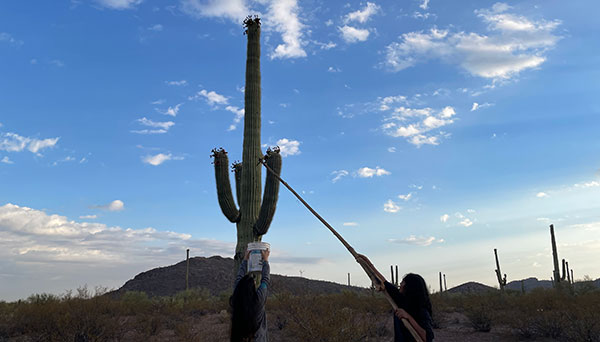Building Multinational Climate Resilience through Cross-Border Shared Learning in Mexico, the United States, and Tohono O’odham Nation
Organization: Borderlands Restoration Network (BRN)
Borderlands Restoration Network partners to grow a restorative economy by rebuilding healthy ecosystems, restoring habitat for plants and wildlife, and reconnecting border communities to the land through shared learning.
Location: In United States: Sells and Topawa on the Tohono O’odham Nation and multiple communities within the San Carlos Apache Tribe in Arizona; In Mexico: Hermosillo, Sonora and Agua Prieta, Sonora.
Country: United States
Other Organizations Involved: Baboquivari High School; Caminantes del Desierto; Nuestra Vida Verde; Cuenca Los Ojos; San Carlos Apache Tribe’s Department of Environmental Protection.
 @ Borderlands Restoration Network
@ Borderlands Restoration Network
Background
The Madrean Archipelago is a culturally and ecologically diverse ecoregion that spans the southwestern United States, northwestern Mexico, and multiple sovereign Indigenous nations. With isolated mountain ranges separated by grassland valleys, the ecoregion hosts such exceptional wildlife diversity that renowned scientist E.O. Wilson dubbed it a Global Biodiversity Hotspot.
Poor land management has caused accelerated erosion, water scarcity, and loss of native species. Additionally, historical racial and cultural marginalization has fragmented the human landscape and contributed to persistent socio-economic inequities. This combination of complex ecological and societal challenges is further strained by climate change, which is predicted to reduce rain events while increasing already severe high temperatures. Cultural, political, and physical borders through the region pose a primary challenge to implementing successful and equitable climate adaptative measures, while limiting collaboration and strengthening inequities.
Goals
BRN intends to stitch fragmented lands and communities back together by engaging in the protection and restoration of shared resources—water, plants, and culture—in the arid Sonoran Desert and surrounding mountainous communities.
Main activities
Six skill-share events will take place on sovereign tribal nations, as well as in Sonora, Mexico, and Arizona, United States. Each event will be structured and led by community experts and designed so as to build a network of climate adaptation solutions for arid lands. Events will include a combination of discussions, presentations, and hands-on activities taught by tribal, Sonoran and Arizonan professionals, who specialize in restoration of wildlands, urban environmental resiliency, and sustainable ranching.
Outcomes
BRN intends to build a strong network of diverse partners working together to support the long-term health of natural and human arid-lands communities by:
- Designing and building outdoor classrooms that harvest 20,000 gallons of rainwater annually and support native and edible plants in tribal nations and Mexican communities.
- Conducting skill-share events in Mexico, the United States, and on Indigenous Nations to share knowledge about flood management, erosion control, sustainable ranching, restoration techniques, soil building, and revegetation.
- Supporting community members, across the borderlands, who are trained in various habitat restoration techniques, to develop community restoration demonstration sites by engaging their communities.